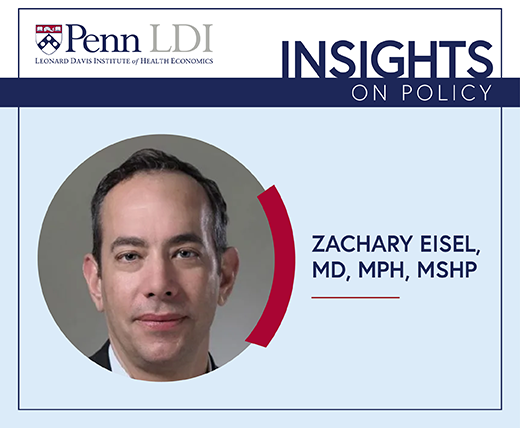
Over 500 U.S. Hospitals Have Stopped Delivering Babies Since 2010
A Crisis in Maternal Care is Unfolding—and it’s Hitting Rural and Urban Communities Alike
News
Amanda Kreider, PhD, an LDI Associate Fellow and Postdoctoral Fellow at both LDI and the Perelman School of Medicine, received an Exceptional Abstract award at the recent annual Conference of the American Society of Health Economists (ASHEcon) in San Diego.

She was cited for her paper, “Service-Level Selection and Access to Specialists in Medicaid Managed Care,” published in the June issue of the Journal of Health Economics.
ASHEcon is a professional organization that promotes excellence in health economics research and has 3,200 members across the U.S. Its Program Chair Awards recognize an exceptional abstract in each of its conference program areas. Kreider’s was in the Insurer and Hospital Behavior category.
The study explained, “Adverse selection, the tendency of high-cost consumers to demand more generous insurance, is a common concern in insurance markets. It is well-established that selection can, and does, distort prices … and can affect more than prices and market stability. It can also incentivize insurers to distort contracts to “cream-skim” low-risk consumers and avoid high-risk consumers. While price distortions affect who enrolls in insurance, contract distortions can reduce the quality of insurance contracts for all who enroll, including restricting access to the benefits most needed by the sickest consumers.”
“Health plans for the poor increasingly limit access to specialty hospitals,” the study continued. “Studying a network change, we find that covering a top cancer hospital causes severe adverse selection, increasing demand for a plan by 50% among enrollees with cancer versus no impact for others. Medicaid’s fixed insurer payments make offsetting this selection, and the contract distortions it induces, challenging, requiring either infeasibly high payment rates or near-perfect risk adjustment. By contrast, a small explicit bonus for covering the hospital is sufficient to make coverage profitable.”
Kreider’s research focuses on the economics of health insurance markets with a focus on public health insurance programs. She is especially interested in factors affecting health care access and coverage for low-income individuals and families, and people with chronic and mental health conditions.

A Crisis in Maternal Care is Unfolding—and it’s Hitting Rural and Urban Communities Alike

Stable Payments Improved Margins But Not Liquidity, New LDI Analysis Finds

LDI Senior Fellow Cited for “Significant Contributions” in Research

Outdated Laws Target Black and Queer Lives in Over 30 States, Fueling a Deadly Disease

Selected for Current and Future Research in the Science of Amputee Care

Research Memo: Delivered to House Speaker Mike Johnson and Majority Leader John Thune